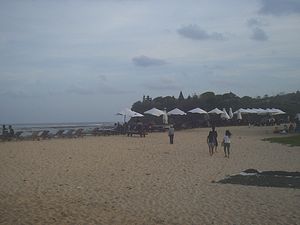The dark side of Southeast Asia’s insatiable appetite for consumerism has manifested itself in several environmental tragedies in the subregion, be it the annual haze problem, disappearing forests and wildlife, and polluted rivers.
But one of the lesser known but nonetheless urgent examples of this has been in the Indonesian island of Bali. The popular tourist destination has seen the beach on its coast inundated with an avalanche of plastic waste, and the problem has continued to escalate, leading to what has been termed a “garbage emergency” recently.
It’s a complaint that has been registered by the millions who have made Bali, which has struggled to cope with Islamic militants and resort developers alike, an annual holiday destination. Even the legendary surfer Kelly Slater warned in 2012 that surfing, a big money spinner for the locals, could soon be impossible unless the island was cleaned-up properly.
Despite ongoing efforts to clean up piling trash, the problem has continued to escalate, with nearly every conceivable item – including coke bottles, syringes, thongs, sunglasses, tetra packs, straws, the ubiquitous plastic bags, drift wood – littering the beach.
Last month, officials said that 50 tons of trash had washed up each day for five days. In response, a quaintly-worded banner was erected on Kuta beach, reading: “We do apologise for this inconvenience, your visit [was] interrupted by natural phenomenon in the form of annual waste of west wind impact.”
In fact, seasoned observers know this is far from a “natural phenomenon.” Rather, it is a manifestation of the impact of excessive commercialization and the lack of attention to environmental protection in Bali.
It is also a symptom of a broader problem in Indonesia, which has been declared the world’s second biggest contributor of marine debris after China. Most of the marine debris that washes up on Bali’s shores, it has been noted, comes from within Indonesia.
The consequences are dire. This problem is not just simply an inconvenience for tourists that frequent the island, but has more important implications too, be it the risks of harming fish which support a robust local fishing industry, or even more serious health issues for inhabitants.
Balinese authorities have announced some additional steps, including banning plastic bags. And other measures such as heavier fines and jail terms for heavy polluters and more aggressive community education programs continue to be discussed. Yet it is far from clear whether these moves will be enough given that such steps are long overdue.
To be sure, Bali is far from the only example of this problem at play in Southeast Asia. Phu Quoc, off the south Vietnamese coast, has a similar issue with garbage discharged from Thailand, and similar cases can be seen in Malaysia, Thailand, and Cambodia.
But the scale of the problem in Bali is what makes the case a particularly stunning one, to the point that it has begun to take the shine off of it as a tourist destination. As the Rivers, Oceans, Lands, Ecology Foundation (R.O.L.E), a nonprofit based in Bali, has noted, the crisis has approached a point to which a travel brochure might read: “Come to the beautiful beaches of Bali! Sun bake amongst the rubbish, dive into the trash filled water and enjoy a skin rash!”
Luke Hunt can be followed on Twitter @lukeanthonyhunt

































